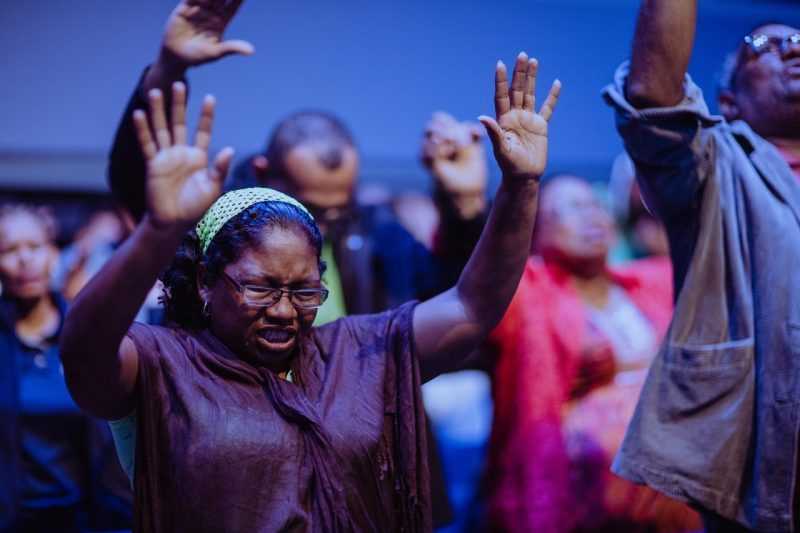Do you ever wonder why we say the Lord’s prayer?
Perhaps some of you have grown up reciting the Lord’s Prayer in church. Maybe others of you have never heard it at all.
Today, I want for us to reimagine prayer by looking at one of the most famous prayers – The Lord’s Prayer.
Let’s learn about the deep truths about God contained in it and the meaning behind its words. Let’s see what it teaches us about prayer.
The Lord’s Prayer: A Template for Prayer.
The concept of prayer is sometimes hard for us to grasp. Talking to a God who we cannot see and may not audibly hear? It can be a weird thing for some, especially for those who have not grown up in the church.
And sometimes prayer can seem daunting to those of us who attended church as kids. After all, even Jesus’ disciples felt that they didn’t really know how to pray appropriately. They asked Jesus to explain how to do so (Luke 11:1-13).
The reality is that prayer is not a complicated thing. It is simply the act of expressing our thoughts and feelings to God who loves us deeply and unconditionally. But we so easily get stuck thinking that we must follow a specific pattern or set of rules.
What is the Lord’s Prayer?
We find the Lord’s Prayer in Matthew Chapter 6. This is where Jesus was teaching the crowds about the Way of the Kingdom and how they should live. He also talked about the attitude with which they should pray as well as how they should pray.
In Matthew 6:9-13 Jesus said, “Pray then like this: “Our Father in heaven, hallowed be your name. Your kingdom comes, your will be done, on earth as it is in heaven. Give us this day our daily bread, and forgive us our debts, as we also have forgiven our debtors. And lead us not into temptation, but deliver us from evil (ESV).”
Also Related: Top 14 Benefits of Connecting with God through Prayer.
Prayer to Recite or Model for Prayer?
There are two main ideas on how the Lord’s Prayer should be used. One idea is that we should recite the Lord’s Prayer itself. And there is nothing wrong with that!
There is a great benefit to thinking through what He said and praying His words. The other idea is that the Lord’s Prayer is more of a template to guide how we pray. This is also a good way to use it.
The reality is that both are true. We can recite the Lord’s Prayer.
We can use it as a benediction or congregational prayer and even as our own personal recitation. But we can also use it as a template to guide the way we pray at other times.
What we choose to use it as is our choice. It depends on what we believe is most helpful in our worship of and relationship with God.
How does the Lord’s Prayer work as a template? To answer that question, we must learn what the phrases in the prayer mean.

What does the Lord’s Prayer Mean for us?
To learn the meaning of the Lord’s Prayer, we need to look at each phrase. What does it tell us about God and how we should approach Him in prayer?
Honor and Reverence
Let’s start with the first phrase: “Our Father in heaven, hallowed be your name.” This phrase tells us two things. One, when we pray the Lord’s Prayer we are addressing God as our father, which indicates a family relationship.
God is our Father, and we are His beloved children. We have the freedom to speak to Him unhindered and ask Him for whatever it is we need. Second, the phrase demonstrates respect for God. It acknowledges the power of His name, which is holy and far above all else.
When talking to God, we should be approaching Him with the right heart and mind. Why? Because we know that He is worthy of all honor and respect. Yes, we have the freedom to come before Him at any time. But freedom does not need to be coupled with carelessness.
Humility
The next phrase is “Your kingdom come, your will be done, on earth as it is in heaven.” Here, the prayer turns from addressing God and His status to asking for His will to be done. This goes beyond simply asking God to act in one’s life.
It is asking Him to enact His will on earth and requesting God’s kingdom to be established here on earth, just as it is in heaven. Notice that asking for God’s kingdom to come and will to be done is the very first request in the prayer.
Asking God to work out His will in our lives is a part of what it means to submit to Him. He is the Lord of our lives and the One who holds all things together.
As scary as it might seem to leave things in His hands and trust Him with the result, it is absolutely essential for us to do. The reality is that we don’t have the ability to control it all ourselves anyway.
Personal Requests
The third phrase says “give us this day our daily bread.” With this phrase, the prayer changes from focusing solely on God’s divine character and will to a personal request that daily needs be met. The Almighty God and King of Kings is a personal God that we can rely on for our everyday practical needs.
We have the freedom, as children of God, to ask for whatever we need. And we can trust Him to provide abundantly. Matthew 21:22 says, “And whatever you ask in prayer, you will receive if you have faith.”
Confession and forgiveness
In the next phrase, “And forgive us our debts, as we also have forgiven our debtors,” we find the element of confession and a request for forgiveness. It also echoes other verses surrounding the prayer.
There is a relationship between our forgiveness of others and the forgiveness which God extends to us. If we do not forgive, we will not be forgiven. But, if we forgive, we will be forgiven (Matthew 6:14-15).
We are all in need of confession and forgiveness because we all sin. 1 John 1:9 says, “If we confess our sins, he is faithful and just to forgive us our sins and to cleanse us from all unrighteousness.”
The last phrase in the Lord’s Prayer states, “And lead us not into temptation, but deliver us from evil.” This final section is a plea for deliverance from evil. We can ask God to intervene in our lives and to rescue us from Satan’s devious plans and our own sinfulness.
Through Christ, we are able to live victoriously. As 1 Corinthians 15:57 reminds us, “But thanks be to God, who gives us the victory through our Lord Jesus Christ.”
Also Related: 13 Reasons Why I Believe in the Power of Prayer.
How Then Should We Pray?
As I mentioned before, the Lord’s Prayer can be used as a model for our own prayers. The same elements contained within it should also be included in our own conversations with God.
Acknowledging His position of authority and power as well as His worthiness, asking that His will be done, bringing our daily needs to Him, asking for forgiveness for our sins, and requesting His intervention.
These are all things that we can include in our prayers, whether we are reciting the Lord’s Prayer or praying for specific things in our lives.
A Word of Caution
One of the issues that can arise with reciting the Lord’s Prayer is that it can become just something we say, while the meaning is no longer in our minds. Apathy sets in and the deep theological truths of the prayer are ignored or unacknowledged.
That was not Jesus’ intention in sharing with his followers this model of how to pray. Just before sharing it, He instructs His followers: “And when you pray, do not heap up empty phrases as the Gentiles do, for they think that they will be heard for their many words” (Matthew 6:7).
God’s desire is that we would come before Him in heartfelt earnest. He doesn’t want followers who do not care about what they are saying. He wants true worshippers who will worship Him in both spirit and truth.
As Jesus told the Samaritan woman during His conversation with her at the well, “But the hour is coming, and is nowhere when the true worshipers will worship the Father in spirit and truth, for the Father is seeking such people to worship him. God is spirit, and those who worship him must worship in spirit and truth” (John 4:23-24).
When we recite the Lord’s Prayer we must not forget Who it is we are talking to and why we are bringing our thoughts and hearts to Him.
We are not speaking to a wall that is lifeless. We are praying to a living God who desires for His people to love and honor Him with their whole hearts.
After all, Jesus taught us that the greatest commandment is “You shall love the Lord your God with all your heart and with all your soul and with all your mind” (Matthew 22:37).

Why the Lord’s Prayer is Important for us Today?
The Lord’s Prayer is important for us today because it teaches us how to pray and what to pray for.
It models for us the respect with which we ought to approach God when we pray while reminding us that we can go to Him for every need because He is our Father. It shows us the importance of humbly submitting to God’s will and authority.
The Lord’s prayer reminds us of our need not only for our sins to be forgiven but for us to practice forgiveness in our human relationships as well. It also teaches us that we are not alone when we face temptation or evil because we have a Deliverer who we know has won the victory.
In addition, it reminds us of God’s character and our status as His children. We can boldly approach His throne to ask for whatever we need and He hears us. Because of the work of Christ as the Crucified Lamb, Risen Savior, and our Great High Priest, we have access to God as His dearly beloved children.
Hebrews 4:14-16 says, “Since then we have a great high priest who has passed through the heavens, Jesus, the Son of God, let us hold fast our confession.
For we do not have a high priest who is unable to sympathize with our weaknesses, but one who in every respect has been tempted as we are, yet without sin. Let us then with confidence draw near to the throne of grace, that we may receive mercy and find grace to help in time of need.”
The attitude and heart behind our prayers matter
Whether we choose to simply recite the Lord’s Prayer verbatim or use it as a model for our personal prayers, ultimately it is our attitude and heart that matters.
Our attitude should be to honor and glorify God because He is worthy of our worship.
And our heart needs to be set on loving Him with all our being because He has loved us and set us apart for His good work.
It is in Him that we can live victoriously because He has already won the battle. He is our good and gracious Father who bestows on us whatever it is we need and blesses us abundantly with every good gift.
What are your thoughts? Do you see the Lord’s Prayer as beneficial to your prayer life? What do the words of the prayer say to you about God’s character and your status before Him?
Do you have a practice of reciting the Lord’s Prayer, whether personally or in church? Why do you say the Lord’s Prayer?





